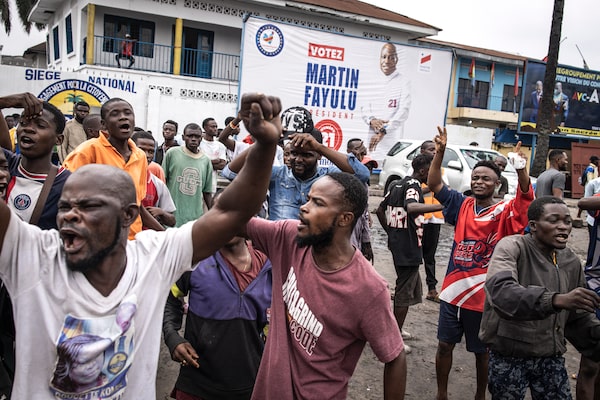
A police officer throws a rock as supporters of opposition leader Martin Fayulu run into his party house during a demonstration in Kinshasa on Dec. 27. Police were deployed in the Democratic Republic of Congo's capital Kinshasa during a banned demonstration against recent elections in the fragile central African state.JOHN WESSELS/Getty Images
Riot police fired tear gas and hurled rocks at opposition supporters to crush a day of planned protests against a disputed election that appears to be delivering a strong victory to President Felix Tshisekedi in the Democratic Republic of the Congo.
With more than 9.3 million votes counted, Mr. Tshisekedi has an overwhelming lead in the official results so far. He holds 77 per cent of the vote, compared with 16 per cent for his closest challenger, wealthy businessman Moise Katumbi, according to a partial count released on Wednesday night.
Five opposition candidates had urged their supporters to take to the streets of Congo’s capital, Kinshasa, on Wednesday to protest the election, which they denounced as fraudulent and chaotic. The government banned the protests and mobilized a massive police presence to shut down any demonstrations.
Police clashed with the protesters at several locations, but the heaviest violence was at the headquarters of opposition candidate Martin Fayulu, who is running third in the partial results. Eleven people were injured by police who surrounded the building and assaulted the people inside, Mr. Fayulu said. He told journalists that the police “attacked us” with live ammunition.
Police denied the accusation. Two police officers were also injured in the violence, according to a police statement.

Supporters of Martin Fayulu sing and dance outside his party house ahead of a demonstration in Kinshasa on Dec. 27. Leading opposition politicians in impoverished but mineral-rich DRC have rejected last week's vote, which was marred by severe delays and bureaucratic disarray, and called for demonstrations.JOHN WESSELS/Getty Images
Congo’s election is being closely watched because the mineral-rich country is one of the biggest and most strategically important in Africa. Its last election in 2018 was tainted when leaked results showed that Mr. Fayulu had won the vote, despite official results declaring Mr. Tshisekedi the winner.
Congo’s interior minister, Peter Kazadi, said on Tuesday that the authorities were banning the day of protests because its organizers were undermining the electoral process and seeking to make the country “ungovernable.”
Mr. Katumbi, however, said the opposition supporters had a right to march peacefully to demand a proper vote after the “sham election” of last week.
Congo presidential candidates call for new vote as chaos, delays mar election
Congo extends voting for some after election marred by delays
In a social media post on Wednesday night, Mr. Katumbi said he strongly condemned the “indiscriminate violence” that the police had wielded against the protesters. “A point of no return has just been crossed,” he said. “This first march will be followed by other actions throughout the country. Cheating, fraud and lying will not pass.”
Last week’s election was marred by lengthy delays at polling stations, illegible voter cards, a badly flawed voter-registration system, malfunctioning voting machines and violent clashes at some stations, election observers said.
Opposition supporters prepare to demonstrate, while riot police officers amass around presidential candidate Martin Fayulu's headquarters to block a protest by the opposition who are calling for a re-run of last week's national election.STAFF/Reuters
Authorities had to extend the voting by a day in many regions, and some places were still voting five days later.
Nearly 44 million voters were officially registered for the election, but it is still unclear how many of them were able to vote. It cost an estimated US$1.2-billion to organize the election across the vast country with poor roads and a largely impoverished population.
Opposition candidates were not the only ones to question the election. A number of civil-society groups and church organizations denounced the electoral disorganization and the irregularities in the vote. Some called for a fresh election.
A coalition of Catholic and Protestant church groups said its election observers had recorded 152 incidents of violence during the voting. Some polling stations were ransacked or looted by furious voters who were fed up with the lengthy delays and bureaucratic disarray.
The disputed election could weaken Congo’s stability at a time when it is already burdened with widespread rebel insurgencies, foreign military interference and one of the world’s largest numbers of forcibly displaced people.
More than a million people have fled their homes in eastern Congo because of a relentless offensive by the Rwanda-backed M23 rebel militia. In recent months, the militia has advanced closer to Goma, the biggest city in the east, sparking tensions between Congo and Rwanda. Earlier this month, Mr. Tshisekedi accused Rwandan President Paul Kagame of behaving “like Adolf Hitler by having expansionist aims.”